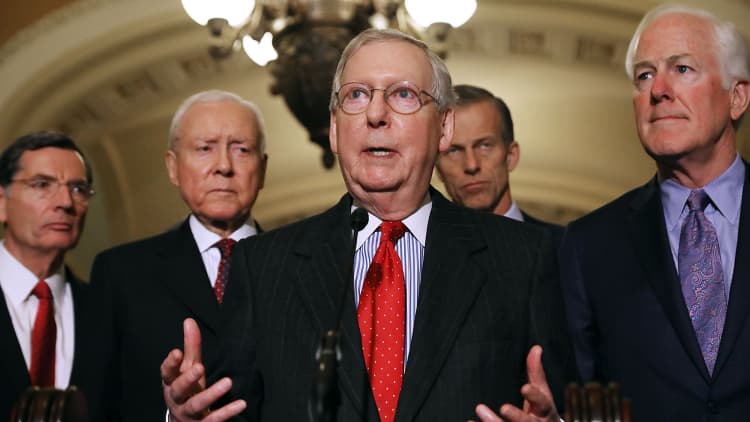
Republican Senate leaders once again find themselves at risk of alienating some of their members while trying to appease others.
A tax bill tool designed to win the support of key GOP senators is finding resistance among others. Still, the rumblings may not be enough to trip up Senate Republicans as they push to pass a bill overhauling the American tax system this week.
On Tuesday, holdout Sen. Bob Corker, R-Tenn., voted to advance the bill to the Senate floor after reaching a tentative deal on including a fiscal "trigger" to ease his concerns about the plan's effects on budget deficits. The mechanism, specific details of which have not been released, would effectively raise taxes if U.S. economic growth doesn't generate as much revenue as expected from the overhaul.
The tool could help to win the support of Sens. James Lankford, R-Okla., and Jeff Flake, R-Ariz., who had similar fears about making up for the nearly $1.5 trillion in estimated tax cuts under the plan.
Not every GOP senator feels the same way about putting the provision in a bill the full chamber could vote on as early as Thursday. While including the fiscal trigger may not sink the chances of passing the bill, it again puts GOP leadership in the tricky position of balancing competing concerns of its members.
Sens. David Perdue, R-Ga., Dean Heller, R-Nev., and Thom Tillis, R-N.C., said Wednesday they did not support the trigger mechanism. None of the senators signaled that including it in the bill would make them vote against it.
Tillis "believes it is unnecessary and could hamper economic growth, however it is not a deal breaker for him," a Tillis spokesman said in a statement.
On Tuesday, Sen. John Kennedy, R-La., said people should consider him "drunk" if he voted to "implement automatic tax increases on the American people," according to Bloomberg. He added that "I'm not voting for that." A Kennedy spokesman did not immediately respond to a request to comment Wednesday on whether the senator's position had changed.
On Wednesday morning, Sen. Pat Toomey, R-Pa., a member of the Senate's tax-writing committee, criticized the trigger but did not go as far as to say he would vote against it.
"I don't like the idea of putting in triggers based on revenue, but I like the idea of passing legislation," Toomey told the Fox Business Network.
Sen. John Thune, R-S.D., the third-ranking Senate Republican, has also expressed doubts about the trigger, Bloomberg reported. As a member of Senate leadership, Thune likely would not vote against the bill.
Spokespeople for Toomey and Thune did not immediately respond to requests for comment.
Senate Republicans walk a tightrope in getting the votes to pass their tax plan. With 52 seats in the Senate, they can only lose two votes and still pass the bill under special budget rules, assuming all Democrats and independents vote against it.
The Senate proposal already makes most individual tax cuts expire within a decade to save money and comply with budget rules. The corporate tax reduction to 20 percent from 35 percent is permanent.
Interest groups like the powerful U.S. Chamber of Commerce have also opposed the trigger provision.
Senators are still negotiating what from the trigger would take, and when it would go into effect. Toomey broadly explained how it could work in the Fox interview Wednesday morning.
"We've got a provision which we will work out the details on — it'll take a look six years from now and determine whether or not we are at the revenue projections that we are making today based on the current policy of the federal government. I certainly hope and I certainly believe that we will be exceeding those revenue levels in which case no change happens. If, however, the revenue is below the target, then we will have to implement at that point, seven years from now, some kind of tax increase that will generate a certain amount of revenue over the next ten years. I don't think this is optimal."
Asked on Tuesday who would bear the brunt of the tax increases under the backstop provision, Corker said he did not want to take away from the "certainty" of tax policy that businesses would want to see to invest. Prompted on whether that means individuals would see their taxes raised while corporations would not, Corker responded that "both" would have an increase.
Outside of the deficit concerns, GOP senators have expressed doubts about other aspects of the plan. Sens. Ron Johnson, R-Wis., and Steve Daines, R-Mont., have argued that the plan helps corporations at the expense of small, pass-through businesses, which pay individual rates.
Johnson, like Corker, voted to advance the bill on Tuesday after he said he got assurances that his concerns would be addressed.
Sen. Susan Collins, R-Maine, also wants legislation passed to curb the effects of scrapping Obamacare's individual mandate. The provision in the Senate tax bill is expected to raise average Obamacare premiums by about 10 percent, according to the nonpartisan Congressional Budget Office.
WATCH: GOP holdouts inch closer to yes on tax bill



